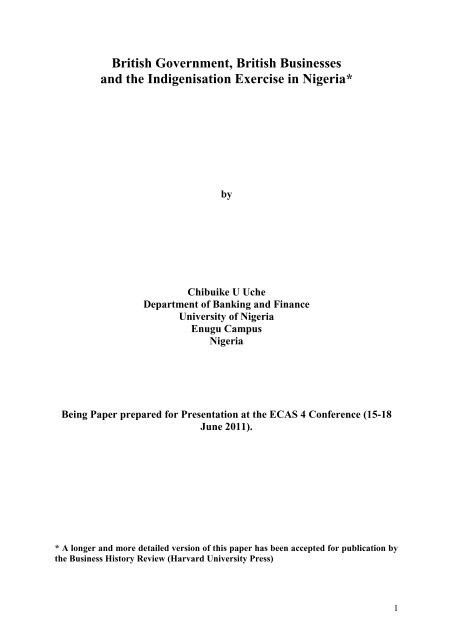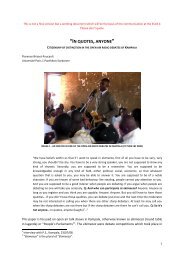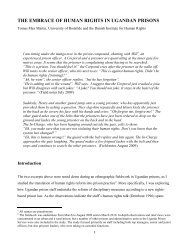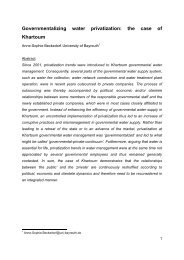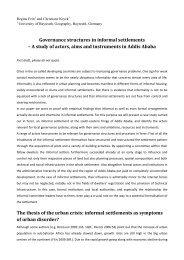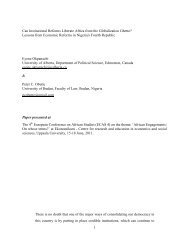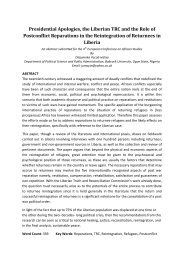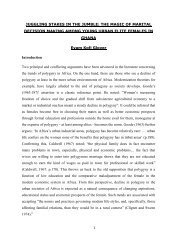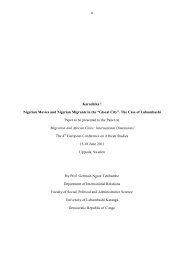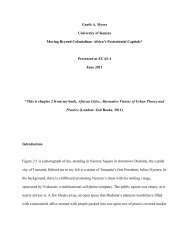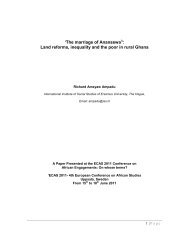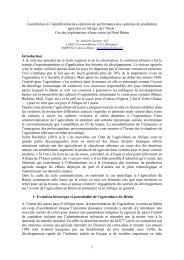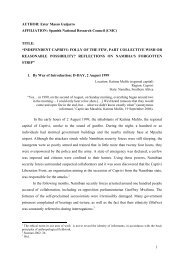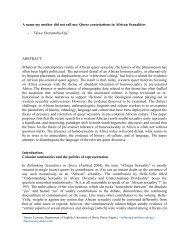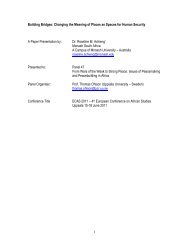Chibuike Uche - The Nordic Africa Institute
Chibuike Uche - The Nordic Africa Institute
Chibuike Uche - The Nordic Africa Institute
Create successful ePaper yourself
Turn your PDF publications into a flip-book with our unique Google optimized e-Paper software.
British Government, British Businesses<br />
and the Indigenisation Exercise in Nigeria*<br />
by<br />
<strong>Chibuike</strong> U <strong>Uche</strong><br />
Department of Banking and Finance<br />
University of Nigeria<br />
Enugu Campus<br />
Nigeria<br />
Being Paper prepared for Presentation at the ECAS 4 Conference (15-18<br />
June 2011).<br />
* A longer and more detailed version of this paper has been accepted for publication by<br />
the Business History Review (Harvard University Press)<br />
1
Introduction<br />
A landmark development in post independence Nigeria‟s business history was the<br />
promulgation of the Nigerian Enterprises Promotions (Indigenisation) Decree (NEPD) of<br />
1972. This exclusively reserved twenty two enterprises for Nigerian citizens or associations<br />
(Schedule 1 companies). Foreign ownership of an additional thirty three enterprises was also<br />
restricted (Schedule 2 companies). This decree was sequel to the Second National<br />
Development Plan which was published by the Federal Government of Nigeria in 1970. In<br />
the plan, the Nigerian government made explicit its intention “to acquire by law if necessary<br />
equity participation in a number of strategic industries that will be specified from time to<br />
time.” 1 In June 1971, the Federal Military Government officially announced its decision to<br />
promulgate the Indigenisation Decree. In effecting the above plan “no consultation as such<br />
took place.” Successions of “secret” drafts of the new decree were however leaked to the<br />
expatriate business community. 2 In 1977, the federal government further increased the stake<br />
of Nigerians in foreign businesses operating in the country by replacing the 1972 Decree with<br />
a more stringent decree. Because Nigeria was at the time Britain‟s “most important ex-<br />
colony”, the British government took keen interest in the development of the indigenisation<br />
process from the very beginning. 3<br />
Given the importance of the indigenisation exercise in Nigeria, it is not surprising that the<br />
topic remains one of the most researched subjects in Nigerian business and economic history.<br />
In the past, for example, researchers have among other issues critiqued the origins of the<br />
indigenisation policy and the provisions of its enabling decrees, 4 the financing mechanism of<br />
the scheme, 5 its role in economic development 6 and strategies adopted by foreign businesses<br />
1 See Federal Republic of Nigeria, Second National Development Plan 1970-74: Programme of Post-War<br />
Reconstruction and Development (Lagos, 1970). P.239. Prior to indigenization, the Nigerian economy was<br />
dominated by foreign businesses. See Odufalu, J, Indigenous Enterprise in Nigerian Manufacturing, <strong>The</strong> Journal<br />
of Modern <strong>Africa</strong>n Studies 9 (1971), 599.<br />
2 See Economic and Commercial Department, British High Commission File Notes dated April 1972 (Public<br />
Records Office (PRO) Board of Trade (BT) 241/ 2558).<br />
3 See McMeekin (Department of Trade and Industry, DTI) to Wilson (Foreign and Commonwealth Office,<br />
FCO) Confidential Letter dated February 9, 1972 (PRO FCO 65/ 1220)..<br />
4 See Beveridge, F, Taking Control of Foreign Investment: A Case of Indigenisation in Nigeria, <strong>The</strong><br />
International and Comparative Law Quarterly 40 (1991), 302-333 and Ndongko, W and Abraham, E, <strong>The</strong><br />
Problems and Prospects of Implementing Nigeria‟s Indigenization Policy, Afrika Spectrum 17 (1982), 67-86.<br />
2
in either adhering to or circumventing its provisions. 7 Very little attempt has however been<br />
made to document the role of foreign governments in attempting to influence the provisions<br />
of the NEPD in order to create a more conducive environment for foreign businesses. This is<br />
because evidences of such roles, particularly the covert ones, are rarely published. Rather, if<br />
documented, they are usually found in restricted internal memos of governments which<br />
normally end up in national archives. Because of their sensitive nature, such materials are not<br />
habitually made public until considerable time has elapsed. 8<br />
Using newly available evidence mainly from the Public Records Office in London, this paper<br />
documents the dialogue between the British government, British businesses and the Nigerian<br />
government at the time and explores how this impacted on the indigenisation process. It<br />
shows how the British Government overtly and covertly interceded on behalf of British<br />
businesses in its bid to create a more conducive environment for their operations during the<br />
indigenization period. At the very least, this gave British businesses more room to rethink<br />
their investment strategies and minimise their losses. Specifically, the British Government<br />
was of the view that profit margins in Nigeria were “traditionally high… (some would say<br />
excessively so) and… provided the new measures are not implemented in any punitive way,<br />
there is still money to be made, albeit less than before.” Given the fact that the British<br />
Government from the very beginning believed that the drivers of the indigenisation process in<br />
Nigeria “will attempt to go as far as they can in increased indigenisation and nationalisation<br />
for as long as they can,” it counselled British firms to “seek a quick return on any investment<br />
made.” 9 <strong>The</strong> forced indigenisation of the capital of foreign businesses ensured that such<br />
businesses increasingly lost interest in long term investments in the country. Such businesses<br />
5 See, for instance, Zayyad, H., Commercial Banks in the Indigenisation of Commerce and Industry in Nigeria:<br />
Problems and Prospects, <strong>The</strong> Nigerian Journal of Public Affairs 3 (1973), 5-11 and Teriba, O, Financing<br />
Indigenization, <strong>The</strong> Quarterly Journal of Administration 9 (1975), 159-176.<br />
6 See Hoogvelt, A, Indigenisation and Foreign Capital: Industrialisation in Nigeria, Review of <strong>Africa</strong>n Political<br />
Economy 14 (1979), 56-68 and Balabkins, N, Indigenization and Economic Development: the Nigerian<br />
Experience (London, 1982).<br />
7 See, for instance, Biersteker, T, Multinationals, the State and Control of the Nigerian Economy (Princeton,<br />
1987); Sanda, A, <strong>The</strong> Challenges of Nigeria’s Indigenization (Ibadan, 1982); Inanga, E, <strong>The</strong> First Indigenisation<br />
Decree and the Dividend Policies of Nigerian Quoted Companies, <strong>The</strong> Journal of Modern <strong>Africa</strong>n Studies 16<br />
(1978), 319-328 and Bobo, B, Multinational Corporations in the Economic Development of Black <strong>Africa</strong>,<br />
Journal of <strong>Africa</strong>n Studies 9 (1982), 13-21.<br />
8 <strong>The</strong> PRO London, for instance, has a thirty year rule in this regard.<br />
9 See Williams to FCO, Confidential Telegram dated July 12, 1976 (PRO BT 241/ 2559) and Pickard (BHC) to<br />
Douglas-Home, Confidential Letter Dated June 15, 1972 (PRO FCO 65/ 1221).<br />
3
mainly focused on reducing their indigenisation related losses. <strong>The</strong> smooth transfer of<br />
management and technical skills to locals was unlikely to have been seen as priority by such<br />
foreign businesses.<br />
At the same time, the social fabric of the Nigerian society had begun to show signs of decay.<br />
<strong>The</strong> country‟s emergent oil wealth increasingly fuelled the deterioration in the country‟s<br />
social values, exacerbated tribal rivalries and oiled corruption. 10 Under this scenario,<br />
“fronting” of Nigerians, which was a mechanism used by foreign businesses to subvert the<br />
capital transfer objective of indigenisation, was extremely profitable for both the<br />
multinationals and their Nigerian “fronts”.<br />
To achieve its objectives, this paper is divided into four parts. Part One traces the origins of<br />
the Indigenisation Decree and the various efforts made by the British government to<br />
influence its contents. Part Two documents how the British government tried to aid British<br />
firms during the implementation of the Decree, which stipulated a deadline of March 1974<br />
for compliance. Part Three discusses how the 1975 change of government in Nigeria<br />
culminated in the revision of the Decree and the role of the British government during the<br />
revision and implementation process. Part Four concludes that the attempt to indigenise<br />
labour and capital together was a major policy error. A more effective policy would have<br />
been to guarantee capital and indigenise labour. At the very least, the “traditionally high”<br />
returns earned by foreign businesses in Nigeria would have created reasonable incentive for<br />
such businesses to respond positively to the indigenisation of labour only policy.<br />
Origins of the Indigenisation Decree<br />
<strong>The</strong> idea of the indigenisation of foreign businesses in Nigeria dates back to 1946, when the<br />
colonial government established the Nigeria Local Development Board. Its main function<br />
was to grant loans to Nigerian owned enterprises. 11 In 1956, a national Committee on the<br />
Nigerianisation of Business Enterprises was set up. Although the Committee‟s<br />
recommendation that aliens be barred from the distributive trade was accepted, it was never<br />
10 See Khan, S, Nigeria: the Political Economy of Oil (Oxford, 1994), 8-9. See also Decker, S., Corporate<br />
Legitimacy and Advertising: British Companies and the Rhetoric of Development in West <strong>Africa</strong>, 1950-1970,<br />
Business History Review 81 (2007), 76.<br />
11 Hoogvelt, Indigenisation and Foreign Capital, 56.<br />
4
properly implemented. This was arguably because the Belewa government was sympathetic<br />
towards western interests. 12 Demands for nationalisation by Obafemi Awolowo, leader of the<br />
opposition, therefore received little support from it. In fact, Okotie Eboh, Belewa‟s Finance<br />
Minister, dismissed such demands as irresponsible. 13 Not surprisingly, the First National<br />
Development Plan made explicit the preference of Government to help private indigenous<br />
businesses grow rather than expropriate foreign business interests. 14 Belewa‟s overthrow in<br />
January 1966 culminated in the Nigerian Civil War (1967-1970). In 1966/ 67, the<br />
government of General Gowon established an Expatriate Quota Allocation Board. <strong>The</strong><br />
objective of this policy was to maximise the participation of Nigerians in the management of<br />
foreign businesses. 15 Such a policy, if well policed, had good potentials. At the very least it<br />
would help ensure the development of competent local management and skilled labour by<br />
these foreign business interests. Given the prominence of labour among factors of production,<br />
the above programme may have proved to be a robust developmental strategy. <strong>The</strong><br />
profitability of the Nigerian market and the fact that foreign business capital remained<br />
unencumbered would have no doubt provided adequate incentive for foreign businesses to<br />
take such local staffing requirements seriously. Unfortunately, such policies were rarely well<br />
thought out and penalties for non compliance were not clearly established. 16 Rather than fine-<br />
tune the mechanism and implementation of the policy and allow time for it to impact on<br />
indigenous development, the Gowon government, arguably emboldened by the country‟s<br />
increasing oil revenue, decided to change direction.<br />
Once the civil war ended in 1970, the Nigerian government opted for the more extreme<br />
policy of indigenising capital. 17 Given their imminent loss of capital and possibly control,<br />
12 See <strong>Uche</strong>, C, Oil British Interests and the Nigerian Civil War, Journal of <strong>Africa</strong>n History 49 (2008), 118<br />
13 Onwuka, R. (1992), A Political Economy of the Control of Transnational Corporations in Nigeria (Owerri,<br />
1992), 72. See also Akinsanya, A, State Strategies toward Nigerian and Foreign Business in Zartman, I (ed),<br />
<strong>The</strong> Political Economy of Nigeria (New York, 1983), 150-2; Donovan, J, Nigeria: Still Safe for US Investors?<br />
Vanderbilt Journal of Transnational Law, 10 (1977), 601-612 and Adejugbe, M, <strong>The</strong> Myths and Realities of<br />
Nigeria‟s Business Indigenization,. Development and Change 15 (1984), 578.<br />
14 Federation of Nigeria, National Development Plan: 1962 -1968, (Lagos, 1962), 24.<br />
15 See Collins, P., Public Policy and the Development of Indigenous Capitalism: <strong>The</strong> Nigerian Experience,<br />
Journal of Commonwealth and Comparative Politics 15 (1977), 141.<br />
16 Decker, S, Postcolonial Transitions in <strong>Africa</strong>: Decolonization in West <strong>Africa</strong> and Present Day South <strong>Africa</strong>,<br />
Journal of Management Studies 47 (2010), 792.<br />
17 This was at least in part because indigenization was at the time fashionable among developing countries. See<br />
MacDonald, G, Recent Legislation in Nigeria and Ghana Affecting Foreign Private Direct Investment, <strong>The</strong><br />
5
foreign businesses were left with three possible responses: loyalty, exit or voice<br />
(engagement). In other words, faced with forced indigenization of at least some of their<br />
capital, such businesses could either accept the terms of the indigenization; or move their<br />
investments elsewhere; or protest and try to influence the provisions of the decree. 18 Given<br />
the handsome profits being made by foreign businesses in Nigeria at the time, engagement<br />
with the political process became the most attractive choice of response to the indigenization<br />
exercise. In this direction, using the mechanism of the home country government in<br />
expressing their views no doubt greatly increased the effectiveness of the engagement process<br />
for British businesses. At the very least, this afforded more time to British businesses to<br />
devise ways of limiting their losses.<br />
From the beginning, it was clear to the British government that the entire indigenisation<br />
scheme was being championed by the group of three economic permanent secretaries –<br />
Allison Ayida (Finance), Phillip Asiodu (Mines and Power) and Ime Ebong (Economic<br />
Development). <strong>The</strong>se “cautious and brilliant administrators” who also authored the Second<br />
National Development Plan, held “strong doctrinaire views” and were “able to force their<br />
policies through the Supreme Military Council whose members are neither brilliant nor able<br />
to assess the practical effects of what is proposed.” 19<br />
From the very onset the government decided to consult widely with the business community<br />
before the promulgation of the Decree. Although the West <strong>Africa</strong> Business Committee<br />
(WAC), an umbrella body established with the aim of protecting foreign business interests in<br />
the country, played a key role in the negotiations, some British businesses also sought the<br />
assistance of the British High Commission in Lagos (BHC) in interpreting and seeking<br />
clarification of the provisions contained in the numerous drafts that were leaked to the<br />
Nigerian business community. 20 In apparent reaction to such requests, British High<br />
International Lawyer, 6 (1972), 555; Kobrin, S., Expropriation as an attempt to control foreign firms in LDCs:<br />
Trends from 1960 to 1979, International Studies Quarterly 28 (1984), 333 and Rood, L., Nationalisation and<br />
Indigenisation in <strong>Africa</strong>, <strong>The</strong> Journal of Modern <strong>Africa</strong>n Studies 14 (1976), 431. Furthermore, the activities of<br />
some multinational firms during the war led to some degree of post war mistrust of these firms by government.<br />
See Ogbuagu, C., <strong>The</strong> Nigerian Indigenization Policy: Nationalism or Pragmatism? <strong>Africa</strong>n Affairs 82 (1983),<br />
254.<br />
18 See Hirschman, A., Exit, Voice, and Loyalty: Responses to Decline in Firms, Organizations,<br />
and States (Cambridge, Mass., 1970).<br />
19 See Pickard (BHC) to Douglas-Home, Confidential Letter dated June 15, 1972 (PRO FCO 65/ 1221).<br />
20 See McMeekin (DTI) to Wilson,(FCO) Confidential Letter dated February 9, 1972 (PRO FCO 65/ 1220)<br />
6
Commission officials held several meetings with Nigerian government officials, all with the<br />
aim of influencing the final decree. Issues that were discussed in such meetings included: the<br />
ability of the Capital Issues Committee to cope with the many new issues that were likely to<br />
be necessary; the concern of British businesses over the determination of appropriate<br />
compensation by the Nigerian government; 21 the question of repatriation of the proceeds of<br />
the shares that were to be issued to the Nigerians; and the restricted timeframe for the conduct<br />
of the indigenisation exercise. 22 <strong>The</strong> request by the British High Commission to be officially<br />
consulted on the final draft of the decree before its publication was however turned down. 23<br />
<strong>The</strong> Decree was finally promulgated on February 23, 1972 and was to take effect from April<br />
1, 1974. It exclusively reserved twenty two enterprises for Nigerian citizens or associations. 24<br />
Foreigners were also barred from participating in the ownership of an additional thirty three<br />
enterprises if the paid up share capital of such enterprises did not exceed £200,000 or the<br />
turnover of such enterprises did not exceed £500,000. If the above limits were exceeded, then<br />
foreign ownership was limited to 60 percent. 25 <strong>The</strong> Decree made explicit that references to<br />
the above paid up capital and turnover should relate to that reflected in the accounts<br />
submitted to the Federal Board of Inland Revenue for the purpose of income tax returns<br />
during the year of assessment: 1968/69, 1969/ 1970 and 1970/ 1971. 26 Once the NEPD 1972<br />
was promulgated, the British government changed focus and channelled its efforts to<br />
21 Confidential notes by C S Pickard (FCO) dated January 26, 1972 (PRO FCO 65/ 1220). See also Pickard to<br />
Wilson, Confidential Memorandum dated February 19, 1972, p.7 (PRO FCO 65/ 1220).<br />
22 <strong>The</strong> decree published in 1972 granted the Federal Commissioner of Industries power, with the prior approval<br />
of the Federal Executive Council, to exempt companies from the provisions of the decree and impose conditions<br />
for such exemptions (section 9).<br />
23 See BHC File Notes by Lawrence Hope dated January 27, 1972 (PRO FCO 65/ 1220).<br />
24 Examples of businesses listed in “Schedule 1” in the decree, included: advertising and public relations, block<br />
and brick manufacturing, haulage of goods by road, garment manufacture, radio and television broadcasting and<br />
retail trade (excepting supermarkets).<br />
25 See Sections 4 and 5 of the Decree. Examples of enterprises affected under this, listed in “Schedule 2” of the<br />
decree included: beer brewing, boat building, bicycle and motorcycle tyre manufacture, bottling of soft drinks,<br />
construction, cosmetics, departmental stores, distribution and servicing of motor vehicles and machines, estate<br />
agency and wholesale distribution.<br />
26 <strong>The</strong> reasoning behind this provision appears to be the determination of the Nigerian government to prevent<br />
companies that had previously understated their profits in the past for tax reasons from presenting different sets<br />
of account for the determination of their share prices. See Graves, E. Indigenization in Nigeria, Black Enterprise<br />
4 (1973), 50.<br />
7
eviewing the indigenisation process constantly, with the objective of defending British<br />
interests. 27<br />
British Government, British Businesses and the Implementation of the 1972<br />
Indigenisation Decree<br />
Even before Nigeria promulgated the Indigenisation Decree in 1972, the British government<br />
had already realised the dangers faced by British businesses in developing countries like<br />
Nigeria, where there was a positive correlation between the windfall economic returns and<br />
the political risks of expropriation. A consequence of this realisation was the introduction of a<br />
government backed investment insurance scheme for British businesses in such countries. 28 It<br />
was therefore not surprising that, from the very onset of the Indigenisation Policy, the British<br />
government was concerned about protecting its commercial interests in Nigeria. Although<br />
there may have been some scope for a consolidated European Economic Community (EEC)<br />
response to the Decree, Britain was wary about championing such a move in order not to give<br />
“the impression to the Nigerians of trying to stir up concerted diplomatic action.” Some EEC<br />
countries however reacted independently. <strong>The</strong> West Germans, for example, objected to the<br />
capital requirement provisions and also about inclusion as “Nigerians” for the purpose of the<br />
exercise of “nationals of OAU member countries whose home governments extend reciprocal<br />
privilege to Nigerian nationals residing in those countries”. 29<br />
Although the definition of “Nigerians” provision was designed to distinguish between<br />
“blacks” and “whites”, it may have benefited non <strong>Africa</strong>ns more. This is because “numerous<br />
aliens rushed to neighbouring OAU countries to become naturalised citizens of such countries<br />
and thereby qualify for benefits conferred on Nigerian citizens or associations”. 30 Others<br />
simply sold their shares to fictitious OAU citizens. 31<br />
27 See Pickard to Wilson, Confidential Memorandum dated February 19, 1972, p.1 (PRO FCO 65/ 1220).<br />
28 See Foreign and Commonwealth Office and Department of Trade and Industry, British Private Investment in<br />
Developing Countries, Presented to Parliament by the Secretary of State for Foreign and Commonwealth Affairs<br />
and the and the Secretary of State for Trade and Industry by Command of Her Majesty (London, April 1971).<br />
29 See Hope (BHC) to McMeekin (DTI), confidential letter dated March 27, 1972 (PRO FCO 65/ 1221). For<br />
explanation for the inclusion of the OAU exemption clause, see Finlayson (BHC) to Piercy (FCO), restricted<br />
letter dated July 21, 1972 (PRO FCO 65/ 1221).<br />
30 Sanda, <strong>The</strong> Challenges of Nigeria’s Indigenization, 40.<br />
31 Graves, Indigenization in Nigeria, 50.<br />
8
While smaller British commercial enterprises may have exploited this loophole, the bigger<br />
British commercial concerns which, no doubt, concerned the British government more, did<br />
not. 32 <strong>The</strong> British High Commission and the British government therefore remained active in<br />
providing guidance and in attempting to influence the Nigerian business environment to the<br />
benefit of such businesses. Once the Decree was promulgated, <strong>The</strong> British High<br />
Commissioner sent a telegram to the FCO advising that it was important for Britain to convey<br />
their concerns about the Decree, especially the limited time provided for share transfers, to<br />
the Nigerian government. 33<br />
Internally, however, the BHC conceded that the indigenisation of foreign businesses in<br />
Nigeria was not unexpected. It argued that despite the astonishing “ubiquitous” presence of<br />
British businesses in Nigeria, its indigenisation exercise “lagged behind such developments in<br />
the rest of the emerging countries.” It was also of the view that given the general acceptance<br />
of the principle of indigenisation, it was unwise to oppose it. <strong>The</strong> British High Commission<br />
therefore asserted that “the most important contribution we could make would be to secure an<br />
extension of the time limit of the whole operation to, if possible, 5 years after the date of<br />
issue of the Decree.” It then concluded that: “our aim should be to recoup from greater direct<br />
exports to Nigeria those losses in invisible earnings which enforced reductions in small and<br />
medium sized investments will cause.” 34<br />
Mr. Goulden of the FCO was however unimpressed by the above views of the BHC and<br />
called for a rethink of the entire British strategy in Nigeria with a view to ensuring that its<br />
commercial interests were protected. According to him:<br />
Passivity may be the best policy available to us. But the stake is enormous. I see that the<br />
JIC [Joint Intelligence Committee] estimates our investment in Nigeria at £129 million –<br />
about a quarter of our total stake in black <strong>Africa</strong> – without even counting our oil,<br />
banking and insurance interests there. <strong>The</strong> trend of federal economic policy threatens<br />
32 See Confidential Memorandum by Pickard dated February 19, 1972 (PRO BT 241/ 2558). See also De<br />
Brauw-Hay, E, Investment in Nigeria and the Nigerian Enterprises Promotions Decree, 1972, Bulletin for<br />
International Fiscal Documentation 29 (1975), 201.<br />
33 See Pickard to FCO, Confidential Telegram dated March 10, 1972 (PRO FCO 65/ 1220).<br />
34 See British High Commissioner Lagos to John Wilson (FCO), Confidential Memo dated February 19, 1972<br />
and British High Commissioner Lagos to Secretary of State for Foreign and Commonwealth Affairs,<br />
Confidential Memo dated June 15, 192 (PRO BT 241/ 2558).<br />
9
what is our largest single interest in black <strong>Africa</strong>. It also threatens, if pushed illadvisedly,<br />
our interests, as consumers, in the continuing production of Nigerian oil<br />
fields…. <strong>The</strong> following issues might merit reconsideration: … If we accept that<br />
somewhere between 40 and 55 percent of foreign equity is to be nationalised. How<br />
should we ensure that reasonable compensation is obtained? … [S]hould we not actively<br />
discourage new UK investment except where it enjoys the protection of partnership with<br />
the Federal Government?... Have we no levers on the Federal Government which might<br />
be used to minimise the scale of nationalisation and to undermine the influence of the<br />
Permanent Secretaries? Our aid programme is rather feeble … but there must be other<br />
ways in which the Nigerians are beholden to us.. Is there any scope for joint action with<br />
our European partners? ... Where do we expect to be in Nigeria by the end of the decade?<br />
<strong>The</strong> present prescription seems to guarantee that we will have lost our investments as<br />
well as our predominant share of the market. 35<br />
On his part Mr Wilson (FCO) suggested that under the current circumstances, British<br />
businesses should be discouraged from making further investments in Nigeria unless<br />
“investors are confident that they can get back their money very quickly.” If this was the<br />
case, then, they would be “making pure profit on their original investment and if they are<br />
eventually taken over, then this is not really catastrophic.” 36 He was however of the view that<br />
it was impractical to overtly or covertly attempt to influence the pace of indigenisation in<br />
Nigeria. He made it clear that Britain did not have any effective levers with the Federal<br />
Government. Its aid to the country was immaterial and there was little scope for joint action<br />
with European partners. 37<br />
Based on the above, Wilson predicted that “within say twenty years, nearly all our<br />
investments in <strong>Africa</strong> will have disappeared.” He suggested therefore that it was time to give<br />
“serious thought to what the pattern of our [future] economic involvement in <strong>Africa</strong> is going<br />
to be.” Specifically, he was of the view that Britain could still “make money in <strong>Africa</strong> while<br />
helping the development of <strong>Africa</strong>n countries.” Possible ways of doing this included<br />
“management and marketing agreements, the provision of technical skills on a contract basis<br />
[and] financing.” He then concluded that “if we are to keep ahead of our competitors we<br />
ought to be giving serious thought now to how best to work out this new pattern of economic<br />
35 See Goulden to Wilson, Confidential Internal Memo of the FCO dated July 13, 1972 (PRO FCO 65/ 1221).<br />
36 See Wilson to Goulden, Undated Memo (PRO FCO 65/1221).<br />
37 See Wilson to Goulden, Undated Memo (PRO FCO 65/1221).<br />
10
involvements both in Whitehall and in consultation with the main British businesses<br />
concerned.” 38<br />
While designing a strategy that would help protect its long term interests in Nigeria and other<br />
developing countries was important to the British government, the Indigenisation Decree<br />
raised numerous issues that needed more immediate attention. From the very onset of the<br />
Indigenisation Decree, for instance, British commercial interests tried to get the government<br />
to expand its definition of indigenous capital to include funds of institutional investors which<br />
were mandated by law to hold only local investments even though their shareholding may be<br />
foreign controlled. 39 <strong>The</strong> Nigerian government was however wary of such ideas and simply<br />
saw such as schemes designed to circumvent the spirit of the indigenisation decree.<br />
Several British businesses also approached the British High Commission for assistance in<br />
their peculiar circumstances. One such business was Monotype Corporation Limited which<br />
specialised in the supply and installation of a wide range of printing and ancillary<br />
equipments. Monotype Corporation was eventually granted exemption status under the<br />
decree. Eighty other firms received varying degrees of exemptions all aimed at giving them<br />
more time to indigenise under various arrangements. Many of these exemptions were<br />
however granted on “questionable grounds”. 40<br />
Unlike Monotype Corporation, not all British firms were worried. One case in point was<br />
Guinness, which was already thinking of ways of getting around the Decree. On June 15,<br />
1972, for instance, Mr. Smedley of the Board of Trade documented his informal discussions<br />
with Mr. Roberts of Guinness on the Indigenisation Decree in Nigeria:<br />
He was very relaxed about things in Nigeria. He said that some years ago Guinness had<br />
sold 10 percent of shares to Nigeria at a 400 percent profit. <strong>The</strong>y only wish now they had<br />
sold more. But they could not complain. He thought there was danger of prices being<br />
depressed by the large number of shares on offer. But he did not seem unduly<br />
38 See Wilson to McMeekin, Confidential Letter dated November 17, 1972 (PRO FO 65/ 1222). See also<br />
Graves, Indigenization in Nigeria, 52.<br />
39 See Ferguson (Irvin and Bonnar) to Hope (BHC), Letter dated March 24, 1972 (PRO FCO 65/ 1221).<br />
40 See Federal Republic of Nigeria, Federal Military Government Views on the Report of the Industrial<br />
Enterprises Panel (Lagos, 1976), 6. Even before the promulgation of the NEPD 1972, it was widely believed<br />
that corruption played a part in determining the shape of the final decree. See Collins, Public Policy and the<br />
Development of Indigenous Capitalism, 134.<br />
11
discouraged by the prospect. He said he thought a number of firms were thinking of<br />
ways of avoiding the main disadvantages of indigenisation. One idea he threw out was<br />
the setting up of local holding companies organised by perhaps a British Merchant Bank<br />
and with Nigerian majority shareholdings which would buy shares…. On the remittances<br />
front, Mr Roberts confirmed what I have always suspected but never seen in black and<br />
white: that international companies fixed things for their employees with side payments<br />
at home under cover of consultancies etc. 41<br />
Another interesting case was that of the United <strong>Africa</strong>n Company (UAC). This was the<br />
most important subsidiary of Unilever in the country, with investments in almost all sectors<br />
of the economy. In order to circumvent the Decree, the company decided to “subsume their<br />
wholly owned advertising and public relations firm, LINTAS, with the main company<br />
thereby frustrating Schedule 1 and robbing Nigerian firms of some juicy accounts.” 42<br />
Although this move was roundly condemned in Nigeria at the time, 43 UAC had its way. 44<br />
In order to maintain control in this booming Nigerian market, many foreign firms resorted to<br />
“fronting.” 45<br />
Given the expectation from the very beginning that the drivers of the indigenisation process<br />
“will attempt to go as far as they can in increased indigenisation and nationalisation for as<br />
long as they can,” it can be argued that the main utility value of such schemes was for most<br />
foreign companies to buy as much time as possible operating in a very profitable market<br />
while the owners were at the same time plundering the business of its capital in order to<br />
reduce their eventual loss. In fact, once the idea of indigenisation was announced, many<br />
foreign businesses started paying out very generous dividends which in some cases exceeded<br />
100 percent of net earnings. 46 Some foreign businessmen may also have employed<br />
41 PRO BT 241/2558<br />
42 See Hall (BHC) to McMeekin (DTI), Confidential Letter dated December 15, 1972 (PRO FCO 65/ 1222).<br />
43 See, for instance, undated Editorial, Nigerian Observer Newspaper (PRO FO 65/ 1222).<br />
44 See Jones, G and Decker, S. Unilever as a “multi-local multinational”. Harvard Business School Case,9-808-<br />
025 (Boston, 2007), 12.<br />
45 Biersteker, T, Multinationals, the State,112-3. See also Biersteker, T, <strong>The</strong> Illusion of State Power:<br />
Transnational Corporations and the Neutralization of Host Country Legislation, Journal of Peace Research 3<br />
(1980), 214-6.<br />
12
unorthodox methods to export their capital out of the country. Had the capital of foreign<br />
businesses not been threatened and labour indigenisation policies clearly spelt out and<br />
monitored, the lure of future profits would have helped encourage foreign businesses to<br />
develop longer term operational strategies in Nigeria and to be more cooperative towards<br />
transferring skills to the local work force.<br />
On its part, the Nigerian Government continued to seek ways of making the indigenization<br />
programme achieve its goals. One hindrance the government attempted to tackle early in the<br />
programme was the issue of funding for the purchase of the shares of foreign businesses by<br />
Nigerians, General Gowon, in his 1972/73 budget speech, announced the decision of the<br />
government to negotiate with commercial banks the extent of government participation in<br />
their ownership and to establish industrial and commercial credit banks to give medium and<br />
long term loans to investors to facilitate the indigenisation policy. 47 <strong>The</strong> government<br />
subsequently decided to take over 40 percent of the shareholding of all expatriate banks<br />
during the 1972/1973 financial year. <strong>The</strong> fear of the government was that without such<br />
control of banks, “lending to the indigenous sector would be insufficient to enable Nigerians<br />
to buy Schedule 1 enterprises and the 40 percent of the other businesses covered by the<br />
Decree… within the time limit that has been set.” 48 All existing foreign banks agreed to the<br />
above proposal except the First National City Bank which decided to withdraw from the<br />
Nigerian market.<br />
<strong>The</strong> negotiation for the government acquisition of the 40 percent shareholding in these<br />
foreign banks was swift but fair. 49<br />
Aside from being forced to support the indigenisation process, another concern of these<br />
foreign banks at the time was the issue of expatriate quotas. <strong>The</strong> banks feared that given the<br />
progressive reductions in its expatriate quota, “there would come a critical point beyond<br />
which they could not go without experiencing a drastic decline in efficiency.” BHC was<br />
46 See Engberg, H., Indigenization of the Business Sector through the Organized Capital Market, <strong>The</strong> Journal<br />
of Management Studies 7 (1975), 6-7 and Uzoaga, W. and Alozienwa, J, Dividend Policy in an Era of<br />
Indigenisation, <strong>The</strong> Nigerian Journal of Economic and Social Studies, 16 (1972), 469.<br />
47 See Piercy to Wilson, dated April 19, 1972 (PRO FCO 65/ 1221).<br />
48 See Hope (BHC) to McMeekin (DTI), Confidential Letter dated May 31. 1972 (PRO BT 241/ 2558).<br />
49 See BHC to McMeekin (DTI), confidential letter dated December 21, 1972 (PRO FCO 65/ 1222).<br />
13
“however assiduous in using its many important Nigerian contacts to plead its case with the<br />
immigration authorities.” 50 <strong>The</strong> Nigerian government however made it clear that the issue<br />
was not negotiable and that the FMG nominees on the boards of the affected banks would be<br />
expected to “exercise influence over the increased and accelerated training of Nigerian bank<br />
employees.” 51 Although the British government conceded that the move towards<br />
Nigerianisation could benefit British businesses since it was “much cheaper to employ local<br />
staff than to send out expensive expatriates,” they were concerned that the companies were<br />
being pressed to replace their expatriate staff faster than was “compatible with reasonable<br />
efficiency” 52 .<br />
<strong>The</strong> Nigerianisation of labour programme was not however limited to banks. In fact all<br />
foreign businesses faced similar pressures. <strong>The</strong> insistence of the Nigerian government,<br />
through the Expatriate Quota Allocation Board, on the Nigerianisation of labour may have<br />
been influenced by the fact that some foreign companies routinely used expatriate staff to<br />
undertake non technical services. A case in point was that of ICI Limited, “an important UK<br />
interest” in Nigeria which was involved in the trading of chemical and pharmaceutical<br />
products from its parent company in the United Kingdom. Although the company had the<br />
potentials of being a manufacturing company, it preferred to remain a trading company and<br />
did little to train Nigerians. This was to the displeasure of the Nigerian Government. 53<br />
Had the Government guaranteed against capital expropriation for such a company and only<br />
insisted on the indigenisation of labour, with a clear timetable and appropriate sanctions for<br />
non compliance, it is unlikely that the above situation would have occurred. This is because a<br />
multinational company that has host country guarantee that its capital will not be<br />
expropriated in a highly profitable market like Nigeria would have found it difficult to risk<br />
sanctions by sabotaging the labour indigenisation policy of its host government. Under such<br />
a scenario, sharp business practices like “fronting” would have been greatly reduced.<br />
Furthermore, the plundering of the capital of foreign businesses which commenced once the<br />
50 See Roberts to Hall, Confidential Foreign Office internal memo dated December 19, 1972 (PRO FO 65/<br />
1222).<br />
51 See File Notes by Hope dated July 26, 1972 (PRO BT 241/ 2558). See also East (BHC) to Wilson (FCO),<br />
Brief dated November 18, 1972 (PRO FO 65/ 1222).<br />
52 See FCO internal memo by John Wilson dated November 10, 1972 (PRO FO 65/1222).<br />
53 See Hall (BHC) to McMeekin (DTI), Letter dated September 5, 1972 (PRO FO 65/ 1222).<br />
14
Government indigenisation intentions became known would have also been reduced<br />
considerably. Perhaps more important, their highly profitable economic interests in Nigeria<br />
would have enticed such businesses to ensure that their local managers received the best<br />
possible training. This would have ensured a more effective transfer of skills to locals. Given<br />
the fact that management and labour skills were major constraints to indigenous economic<br />
development at the time, it would only have been a question of time before well run<br />
indigenous enterprises emerged.<br />
It was therefore not surprising that the forced indigenisation of capital was not very<br />
successful in achieving the important goal of skills transfer to locals. <strong>The</strong>re was no incentive<br />
for this to happen. Rather, in order to make “fronting” more efficient, the new local majority<br />
shareholders were skilfully selected by the owners of the foreign businesses, based mainly on<br />
their docility or corruption. 54 This certainly did not augur well for skills transfer. Ironically,<br />
as will be seen in the next section, the NEPD was also not very successful in transferring<br />
even the capital of foreign businesses to Nigerians. Arguably because of internal corruption<br />
and external pressure, the March 31, 1974 deadline for its full implementation came and<br />
passed without any pronouncement by the Government. This remained so until July 29 1975<br />
when General Gowon was overthrown in a coup d‟état.<br />
<strong>The</strong> 1975 Change of Government and the Indigenisation Process<br />
<strong>The</strong> 1975 change of government in Nigeria provided an excellent opportunity for groups<br />
unhappy with the implementation of the indigenisation exercise to demand a review of the<br />
entire process. Concerns ranged from extent of compliance to the dominance of the emergent<br />
local elites in the share ownership of indigenized companies and loopholes for circumventing<br />
the Decree altogether by foreigners. <strong>The</strong> result of these complaints was that on November 17,<br />
1975, the federal government set up the Industrial Enterprises Panel headed by Wole<br />
Adeosun to examine the entire indigenisation exercise. 55 <strong>The</strong> Adeosun Panel subsequently<br />
submitted its Report in 1976.<br />
54 See Hoogvelt, Indigenisation and Foreign Capital, 62-65<br />
55 For the detailed terms of reference of the Panel see Federal Republic of Nigeria, Federal Military Government<br />
Views, 3.<br />
15
<strong>The</strong> Adeosun Report concluded that “the achievement of the scheme as implemented to date<br />
fell short of expectation.” With respect to compliance, for instance, the Report documented<br />
that as at June 30, 1975, only 314 businesses out of the 950 businesses affected by the Decree<br />
had complied with its provisions. This figure, which excluded businesses exempted from the<br />
provisions of the Decree, represented 33 percent compliance. <strong>The</strong> Report also reported that<br />
many of the businesses granted exemptions under the Decree secured such exemptions<br />
through questionable means which included: fronting, naturalisations and excessive<br />
amendments of Decree for flimsy reasons. <strong>The</strong> report further blamed the failure of the<br />
programme on the weak understaffed administrative machinery that was put in place for its<br />
implementation. 56 In order to plug the above loopholes, the report contained a draft of a new<br />
NEPD to replace the 1972 NEPD.<br />
As with the 1972 Indigenisation Decree, the government held extensive consultations with<br />
the various big businesses before it published the White Paper on the report. Specifically, the<br />
government made it clear to the big foreign companies that the prime targets of the<br />
government in proposing the new decree were “the Lebanese and Indian businessmen.” In<br />
fact, “Permanent Secretaries had been instructed to discuss it with the larger firms and in<br />
particular, to get their views on the feasibility of the proposals.” 57<br />
After the publication of the White Paper, some British businesses had difficulties interpreting<br />
the provisions of the draft indigenisation decree it contained. One murky area was the issue of<br />
dividend payments. Specifically, it was not clear whether the 30 percent limitations placed on<br />
dividend payments related to pre tax profits or paid up capital. UAC subsequently attempted<br />
to issue an interim dividend which was equivalent to 50 percent of its paid up capital. <strong>The</strong><br />
Government promptly criticised this and demanded that it be withdrawn. This clearly<br />
indicated that the 30% dividend restraint was supposed to be as a proportion of paid up<br />
capital not pre-tax profits. 58 Concerned by this development, the British Government<br />
counselled that should such restrictive dividend policy continue, “firms (particularly those<br />
56 Federal Republic of Nigeria, Federal Military Government views, 4. See also Biersteker, T, Indigenization in<br />
Nigeria: Rationalization or Denationalization? In Zartman, I (ed), <strong>The</strong> Political Economy of Nigeria, (New<br />
York, 1983) pp.189.<br />
57 See Johnson to Spenser, Restricted Internal Memorandum dated July 9, 197 (PRO BT 241/2559) and See<br />
Spencer (BHC) to Roberts (FCO), Confidential Telex dated August 10, 1976 (PRO BT 241/ 2559<br />
58 See Faulkner (BHC) to Formstone (DTI), Letter dated July 15, 1976 (PRO BT 241/ 2559).<br />
16
like contractors with small equity capital in relation to turnover and profits) will need to look<br />
very carefully at whether there is any point in expanding their operations here” or moving<br />
such to other competing jurisdictions like the Gulf. It further asserted that British firms “may<br />
[need to] develop other methods of getting their money out of the country.” 59<br />
Under the decree, which was eventually published on January 12 1977, Nigerians were to<br />
participate compulsorily in the ownership of all companies. Schedule 1 companies were<br />
exclusively preserved for Nigerians. <strong>The</strong>y were also to have at least 60 percent and 40<br />
percent equity interests respectively in schedule 2 and schedule 3 companies. Examples of<br />
schedule 2 companies included: plantation agriculture, boat building, banking and insurance.<br />
Examples of schedule 3 companies included: manufacturing of engines and turbines,<br />
agricultural machinery and electrical appliances. <strong>The</strong> Decree, which gave most businesses up<br />
to December 31, 1978 to comply with its provisions, took into consideration some of the<br />
concerns of the foreign businesses. For instance, multinationals whose business operations<br />
straddled more than one schedule, were allowed to continue all their operations if Nigerians<br />
owned at least 60 percent of the consolidated company, their annual turnover was not less<br />
than N25,000,000 and the business of the body corporate was being carried on in not less<br />
than 10 States in the Federation. 60<br />
<strong>The</strong> above provision was no doubt the outcome of negotiations with UAC which, with a<br />
turnover of £600m and profit after tax of £50m, was the principal UK trading concern in<br />
Nigeria at the time. 61 In fact, this “concession was so obviously aimed at the UAC(N) that<br />
it became known as „the UAC article‟.” 62 This may also explain why the federal<br />
government did not accept the recommendations of the Adeosun Panel that: all “cases of<br />
regrouping, particularly those of the U.A.C. of Nigeria Limited, BEWAC, Leventis and<br />
John Holt groups etc. should be reviewed.” 63<br />
59 See Williams (BHC) to FCO, Confidential Telex dated July 9, 1976 (PRO BT 241/ 2559).<br />
60 See Section 7 (1) of the NEPD 1977.<br />
61 See Formstone to Secretary of State for Trade, Internal Board of Trade memorandum dated August 12, 1976<br />
(PRO BT 241/ 2559).<br />
62 Fieldhouse, D, Merchant Capital and Economic Decolonisation: <strong>The</strong> United <strong>Africa</strong> Company 1929-1987,<br />
(Oxford, 1994), 665.<br />
63 See Federal Republic of Nigeria, Federal Military Government’s Views, 7.<br />
17
Foreign businesses however did not win concessions on every front. Despite the negotiations<br />
and fine-tuning of successive drafts of the decree, the Nigerian government refused to budge<br />
on some issues. It was believed, for example, that the 60 percent participation level by<br />
Nigerians in the enlarged list of Schedule 2 activities represented “a more radical degree of<br />
indigenisation than some local businessmen expected”. 64 UAC, for instance, which was<br />
unhappy with this, subsequently met with the Secretary of States for Trade to raise its<br />
concerns. 65 Around the same time, an official delegation from the West <strong>Africa</strong>n Committee<br />
also met the Chief of Staff, Supreme Headquarters, Brigadier Yar‟Adua to express their<br />
concerns about the proposed decree. <strong>The</strong> delegation pointed out that the Third National<br />
Development Plan (Chapter 2, Paragraph 29) made explicit that it was the intention of<br />
government to consolidate and not to advance compulsory ownership indigenisation in the<br />
Plan period which went up to 1980. By its decision to increase indigenous participation and<br />
wrest control of most businesses from the expatriates the “comfort given to overseas interest<br />
by this assurance had been undermined.” 66 It was in the midst of all these complaints that the<br />
Federal Commissioner for External Affairs, Brigadier Joseph Garba summoned diplomats<br />
and warned them to desist from sabotaging the indigenisation exercise. 67<br />
One of the enterprises slated for a minimum 60 percent participation by Nigerians (Schedule<br />
2) was banking. Even before the 1977 NEPD Decree was promulgated, the government had<br />
already made explicit its intention for this sector. On 29 June, 1976, for instance, the<br />
Government announced its decision to “take over 60% of the shares of all banking<br />
institutions in the country.” This was defended on the grounds that because the Government<br />
wanted banks to play a prominent role in the indigenisation exercise, it was necessary for it to<br />
share in the “risk that is involved in banks expanding operations in the non traditional sectors<br />
of banking activities”. 68<br />
64 See Williams to FCO, Confidential Telegram dated July 12, 1976 (PRO BT 241/ 2559). See also Johnson to<br />
Spenser, Restricted Internal Memorandum dated July 9, 1976 (PRO BT 241/2559).<br />
65 See Secretary of State for Trade Office Minute Number 999 dated July 19, 1976 (PRO BT 24/ 2559).<br />
66 See BHC Notes for the Records by Williams dated September 1, 1976 (PRO BT 241/ 2559).<br />
67 See Nigerian Chronicle Newspaper, July 26, 1976.<br />
68 See Statement by the Federal Commissioner of Finance, Mr. A E Ekukinam to the Chief Executives of<br />
Banking Institutions on Aspects of Federal Government Banking Policy dated June 29, 1976 (BT 241/ 2559).<br />
18
<strong>The</strong> government subsequently set up a panel chaired by Ime Ebong to negotiate with the<br />
concerned banks. On this occasion the government was not as generous as in the past on the<br />
issue of transfer price. In fact, Ime Ebong “was obviously working to strict guidelines with<br />
very little discretion.” In the case of UBA, for instance, the negotiations for the transfer price<br />
were like “bargaining in an eastern bazaar, both sides moving 2 Kobo at a time.” Barclays got<br />
“considerably less than a fair price for their shares”. <strong>The</strong>y were particularly disappointed<br />
because the price for the first 40 percent taken over by the government had been “quite<br />
reasonable.” Another issue raised by Barclays during the talks was the fact that it might be<br />
forced to change its name after losing control, as it may no longer be in a position to<br />
guarantee standards. <strong>The</strong> panel reacted strongly to this suggestion and the matter was<br />
downplayed. 69<br />
Compared with the NEPD 1972, the NEPD 1977 recorded a much higher compliance rate. 70<br />
This was arguably because most of the loopholes contained in the NEPD 1972 had been<br />
blocked. With limited room for manoeuvre, foreign appetite for Nigerian investments<br />
increasingly waned. Even in industries where foreigners were still allowed to participate, they<br />
were reluctant to invest since control was not guaranteed. Unfortunately, indigenes lacked<br />
both the capital and technical know how to undertake such ventures at the time. Given the<br />
forced nationalisation of capital, there was little incentive for the expatriate owners of such<br />
businesses to help develop indigenous labour. This may explain why the December 31, 1978<br />
deadline for compliance with the provisions of the decree passed unceremoniously.<br />
<strong>The</strong> above position was further complicated by the declining economic fortunes of the<br />
Nigerian government which was directly linked to the dwindling oil revenues at the time. <strong>The</strong><br />
civilian government of Shehu Shagari, which at inception in 1979 made it explicit that it<br />
inherited an empty treasury, was clearly not in a strong position to advance the case for<br />
indigenisation. To the contrary, the government tried to encourage foreign participation even<br />
in areas reserved under the NEPD 1977 for Nigerians. In 1981, for instance, it transferred<br />
69 See BHC file notes by Williams dated August 20, 1976 (PRO BT 241/ 2559). Barclays Bank eventually<br />
changed its name to Union Bank of Nigeria Ltd in 1979.<br />
70 See Ndongko and Abraham, <strong>The</strong> Problems and Prospects of Implementing Nigeria’s Indigenization Policy,<br />
67-86; Diai, S, Encouraging Response to Indigenization Decree, Nigeria Trade Journal 26 (1979), 19-20 and<br />
Ejiofor, <strong>The</strong> Limitations of Indigenization Decree, 36;<br />
19
agricultural plantations, fertiliser production and the manufacturing of cement and metal<br />
containers from Schedule 2 to Schedule 3 of the NEPD 1977. 71 Continued deterioration in the<br />
economy of the country led the later government of General Babangida to adopt the<br />
Structural Adjustment Programme (SAP) in 1986. <strong>The</strong> SAP era saw the conversion of the<br />
1977 Indigenization Decree into a much more liberal industrial policy in 1989. Under the<br />
new policy, foreign investors were allowed to own up to 100% equity in new businesses in<br />
the country. Such investors were also allowed equity participation in the sum of twenty<br />
million naira and above in the cases of the 40 businesses hitherto exclusively reserved for<br />
Nigerians. 72 Arguably because the Government was still smarting from its indigenisation<br />
policy failure, it did not have the courage to insist on labour indigenisation for the new<br />
foreign capital it hoped to attract. No clear and definite mechanism was therefore put in place<br />
for this to occur in the future. This brought to an end the bold attempt by the Nigerian state to<br />
take control of its economy.<br />
Conclusion<br />
This paper attempted to document the dialogue between the British government, British<br />
businesses and the Nigerian government during the indigenisation era and how this impacted<br />
on the indigenisation process. It shows how the British Government overtly and covertly<br />
interceded on behalf of British businesses in its bid to create a more conducive environment<br />
for their operations during the indigenization period. Given the exigencies of the time, the<br />
British Government also counselled British companies to take short term positions and seek<br />
quick returns on any investments made. Some foreign businesses also developed various<br />
mechanisms for circumventing the NEPD like “fronting.” Corruption helped ensure that such<br />
foreign companies had willing Nigerian accomplices that aided their sharp practices. All<br />
these could not have augured well for skills transfer to locals. This paper argues that this bold<br />
attempt to indigenise labour and capital together was a major policy error. Had the<br />
Government only insisted on the Indigenisation of labour, the future returns on foreign capital<br />
already invested, which was “traditionally high” in the Nigerian environment at the time,<br />
would have created reasonable incentive for foreign businesses to respond positively to such<br />
71 See Onwuka, A Political Economy of the Control of Transnational Corporations, 80.<br />
72 Ibid, 84<br />
20
equirement. Perhaps more important, such a policy would have helped in the rapid transfer<br />
of important management and technical skills to Nigerians.<br />
21


